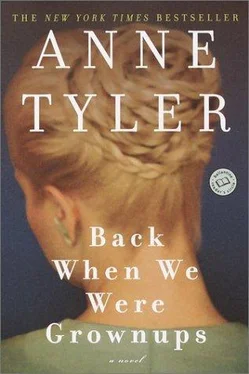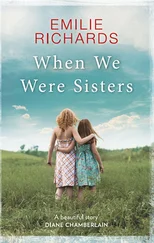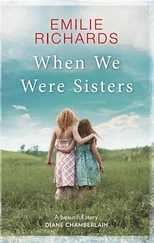“Aha! See there?” Rebecca crowed, pointing her fork at him. Then she glanced toward the window and lowered her voice. “You’re bearing out my theory about prophetic moments.”
“Pathetic?” Will asked.
“Prophetic. Moments that predict a couple’s future. See: at the very start of your courtship, she was threatening to leave you.”
“But I thought it was just a normal student interview. I had no idea that that was the start of our courtship.”
“No, of course not. That’s how prophetic moments work,” Rebecca told him. “You don’t suspect that’s what they are at the time they’re taking place.”
“It does seem I should have heard some kind of alarm going off,” Will said. “This was the course I was always so proud of, the one where I showed beginning students that physics could be an adventure.”
Rebecca said, “Oh, what a shame.”
“And she never did really take to the subject,” Will said sadly. “She stayed on after I convinced her but dropped the course second semester; switched to ecology instead to finish up her science requirement. Ecology! A pretend sort of science. But all I thought at the time was, now I could ask her out. I must have been blind as a bat.”
“ She must have been blind, to think physics was irrelevant,” Rebecca said.
“Well, that’s where the two of you differ,” Will told her. “Laura’s a more superficial type of person. What matters most to her are material things. Clothing, makeup, hairstyles, jewelry… On every possible occasion, including Easter, she expected me to give her a gift of jewelry.”
“Really!” Rebecca said. This was getting interesting. “What kind of jewelry?”
“Oh… I don’t know.”
“I mean, important jewelry, like diamonds? Or just a new charm for her bracelet or something.”
He stopped stirring his salad and looked at her.
“Well,” she said hastily, “some women are like that, I guess.”
“She owned so many shoes that a closet company had to come build a special rack in her closet.”
“Gracious!”
Rebecca owned a lot of shoes herself. Not that she was a spendthrift. These were very cheap shoes, purchased on sale or at discount stores. But they seemed to have a way of not fitting quite right a short while after she bought them, and so she was always buying more. Mentally, now, she began discarding the extras. Those brown suede clogs, for instance: she could easily get rid of those. She had worn them exactly once and discovered that her heels hung half an inch over the backs, although she could have sworn they’d fit perfectly when she first tried them on.
“Plus another thing is, they’re so jealous,” the nursery man was saying. He grunted, and then she heard the thud of a rock or a root stob as he heaved it aside. “They phone you all the time and they ask you what you was doing if you take a minute to answer. They show up at your door and check out you’re not cheating on them. This one guy I know, he had to move to Arizona finally just to get shed of this woman who was always on his tail.”
“It’s more than a fellow can handle, sometimes,” the second man agreed.
Rebecca slid her chair back and rose to shut the window. She tried to make no noise, but she had a glimpse of two startled faces looking directly into her eyes before she turned away. When she had reseated herself, smoothing her skirt beneath her, she said, “You know, I’ve always regretted not completing my education.”
“You could do that now,” Will told her.
“Well, yes. Yes, I could! In fact, I’ve just started reading a biography of Robert E. Lee.”
“Lee,” Will said consideringly.
“Remember, how I had this new theory about Lee’s real reason for deciding to cast his lot with the South? And the other day I thought, I should go on with my research anyhow, just out of sheer curiosity.”
“Well, there you have it,” Will told her. “Laura’s got no curiosity whatsoever.”
Rebecca clucked. The telephone rang.
He said, “Don’t you want to answer that?”
“No, never mind.”
She waited till the ringing stopped, which seemed to take forever. Then she said, “So she isn’t a scholar.”
“Who isn’t?”
“Laura.”
“No, not in the least.”
She hoped he would elaborate, but just then the phone started ringing again.
“You certainly get a lot of calls,” Will told her.
“Yes,” she said. She sighed. “Won’t you have more chicken?”
“No, thanks, I couldn’t eat another bite.”
Her own plate was nearly untouched. Even so, she removed her napkin from her lap and prepared to slide her chair back. “I’ll go make us some coffee,” she said. “Would you prefer regular, or decaf?”
“Neither, thanks.”
“I can have it ready in a jiff.”
He said, “I never was in the habit of coffee, you may remember.”
She didn’t remember, actually. She remembered only that he hadn’t liked sweets — unusual, in a young man. But when she said, “I purposely did not fix a dessert,” he said, “Oh, that’s all right,” as if he thought she was apologizing.
“I mean, I didn’t suppose you’d want one.”
“No, really, I’m fine.”
She gave up. “Well,” she said, “shall we go into the parlor, then, where it’s comfortable?”
Instead of answering, he leaned toward her. The movement was so sudden that she wondered, for a second, whether he had a stomachache. “Rebecca,” he said, “it’s occurred to me that this was providential.”
“Was… what?”
“That first night you telephoned, I had just about hit bottom. It was so incredibly providential that you called me when you did, Rebecca.”
He reached across the table and gripped one of her hands. Unfortunately, it was the hand that held her scrunched-up napkin. Also, she felt an instantaneous, nearly overwhelming urge to wriggle her fingers frantically, like some kind of undersea creature. She forced them to stay motionless, although the urge was so intense that she was almost vibrating. At the same time she had to remember to make her eyes look wider than they normally were, and to keep her head raised high so that the cushion of flesh beneath her chin would not reveal itself.
Then the front door slammed against the closet, and Zeb called out, “We’re home!”
He had promised they wouldn’t be back till ten! Or nine-thirty, at the earliest! But here came Poppy’s cane tip-tapping through the two parlors, following Zeb’s softer tread. Will withdrew his hand.
“In the old days, ice-cream places offered unlimited samples,” Poppy was saying. “Any kind of flavor you liked — eggnog, pistachio, rum raisin — on little wooden spoons for you to try before you committed yourself.”
They arrived in the dining-room doorway. “Well, hi, there!” Zeb exclaimed, in what struck Rebecca as an artificial tone of voice.
“What are you doing here?” she asked him coolly.
“We stopped for ice cream after supper and Poppy was so displeased with the service, he said he’d just as soon have his dessert here at home.”
He was looking not at her but at Will, who had turned partway around in his seat to see him. Rebecca still had a distant hope of avoiding introductions — if Zeb and Poppy would only retire tactfully to the kitchen, while she and Will moved into the front parlor — but now Will rose and held out his hand. “How do you do,” he said. “I’m Will Allenby.”
“I’m Zeb, Rebecca’s brother-in-law,” Zeb said, shaking his hand. With his poor posture and his dingy, wire-rimmed glasses, his strings of oily gray hair hanging over his forehead, he seemed almost ugly tonight. “This is my uncle, Paul Davitch,” he said. “Sorry to barge in like this.”
Читать дальше












